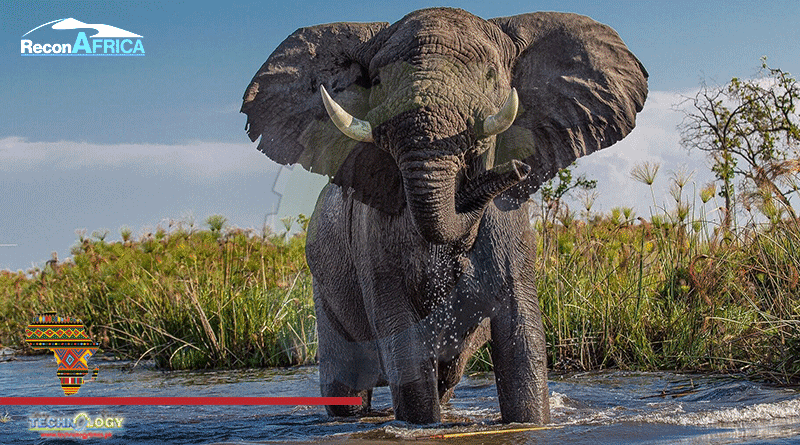University Of Oxford’s Wildlife Conservation Research Unit Counted African Elephants From Space Using Satellite Technology

Canadian oil and gas company ReconAfrica, listed on stock exchanges in the US, Canada, and Germany, plans to build a massive new oilfield in one of Africa’s last great wildernesses. Experts warn that the proposed oilfield, spreading across Namibia and Botswana, would threaten thousands of African elephants and devastate local ecosystems, wildlife, and regional communities. This project is the latest threat to elephants in the area, hundreds of which have died over the past year. Conservationists believe the cause of the deaths is linked to rising levels of toxic algae – caused by global heating and increasing CO2 levels – in their waterholes.
ReconAfrica has leased over 34,000sq km of land in Africa’s Kavango Basin. Seismic exploratory work has already begun, and experts claim that the new oil field could be one of the largest of recent years. In addition, ReconAfrica estimates that the “potential oil produced” could be between 60 billion and 120 billion barrels worth billions to the local economy. According to the Namibian government, just exploratory licenses have been granted so far, not permitting any production operations. In addition, it noted that the exploratory wells are not sited at any “conservancy or environmentally sensitive area and will have no significant impact on our wildlife.”
However, ReconAfrica’s plans have attracted criticism from green groups who say the project could jeopardize critical water supplies and threaten the Okavango Delta in Botswana, a vast pristine wilderness and World Heritage Site, and one of the world’s most diverse ecosystems. What’s more, Alles stresses that the vibrations from exploratory work disturb elephants, and the increase in construction, roads, and traffic would drive the animals away, opening the area up to uncompassionate poachers. “Especially when they have young, they avoid areas where there is any human activity, where there is noise and what they see as danger. This can drive them away from their ancient migratory routes and closer to villages and agricultural areas, leading to more human-elephant conflict,” explained Alles.
However, ReconAfrica argues that the project will bring many jobs and significant economic benefits to the region without harming the wildlife and environment. “We sincerely believe that the region’s stable energy industry can be developed in an environmentally and socially responsible manner that is accountable and supports the development and delivery of much-needed economic and social benefits, as well as funding investments in local wildlife and ecological conservation,” commented a company spokesperson.
The company claimed that there were “measures in place” to address vibration and noise issues, including:
- The installation of solar-powered community water wells.
- Using water-based, biodegradable, and chloride-free drilling fluids.
- Using low-frequency equipment to “protect wildlife communications.”
- They would not “operate at night when elephants typically communicate.”
We are committed to continuing to work closely with, and under the direct oversight of, the governments in both countries, as well as their regional and traditional authorities, to ensure we continue to comply with relevant laws and regulations throughout all the stages of our operation. In May, the International Energy Agency said that the exploitation and development of new oil and gas fields have to end this year for the world to remain within safe limits of global heating and meet the ‘net zero emissions by 2050’ goal. Environmentalists point out that extracting billions of barrels of fossil fuels from a massive new oil field in Africa would directly contradict that conclusion – with potentially catastrophic consequences for the climate crisis. Fridays For Future Windhoek, an environmental conservation organization, based in the Namibian capital, describes the oilfield as a “carbon gigabomb.” At the same time, campaigners fear that it could act as a gateway for other projects in southern Africa to follow suit if it goes ahead. According to Ina-Maria Shikongo, one of the organization’s coordinators, the region has already been hit by droughts and extreme heat, while climate refugees looking for work and food are becoming more and more common.
Furthermore, Bassey is confident that oil extraction would not bring prosperity to the Namibian people, adding that the entire world needs to move away from fossil fuels in the next ten years to avoid climate breakdown. It is essential to understand that we cannot afford to replicate the methods and pathways used by the west to get to where they are today. Searching for new oil wells at this time simply means searching for trouble for our nations and the planet. He points out that to “ensure justice in the transition from dirty energy,” western nations should provide financial support to keep fossil fuel resources in the ground by paying an “ecological or climate, debt” that would enable countries (like Namibia) to “build resilience and follow a development path that is in line with planetary limits.” Earlier this year, scientists led by the University of Oxford’s Wildlife Conservation Research Unit counted African elephants from space using satellite technology. The breakthrough could help the conservation of this majestic species.
This news was originally published at Intelligentliving
